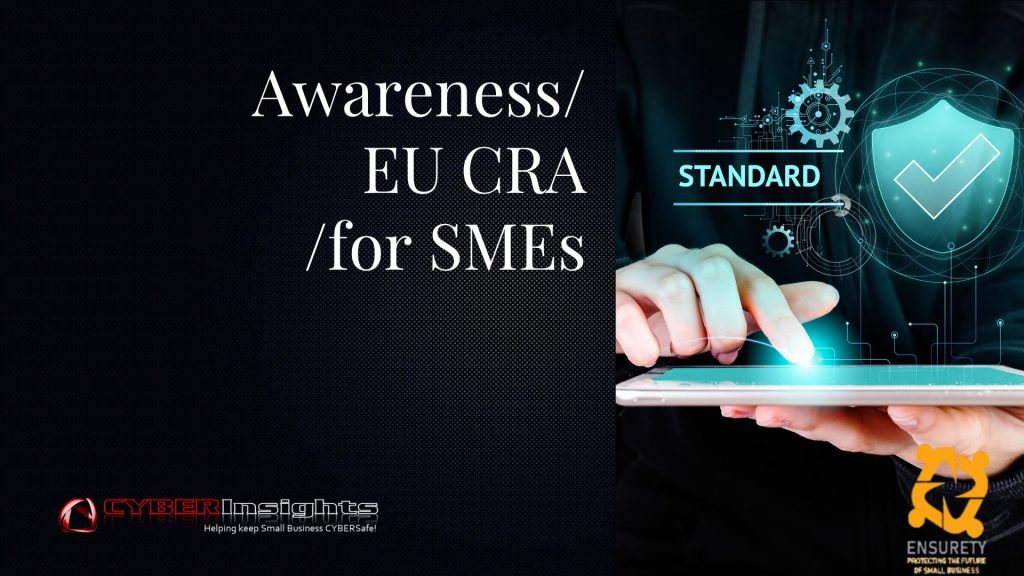CYBER AWARENESS: The European Union Cyber Resilience Act: A Guide for Small Business Owners
October 4, 2024EEU CYBER RESILIENCE ACT: The European Union Cyber Resilience Act: A Guide for Small Business Owners – As the world becomes increasingly digitized, the importance of cybersecurity has surged. Recognizing this, the European Union (EU) introduced the Cyber Resilience Act (CRA), a comprehensive legislative framework aimed at enhancing the security of digital products and services. The CRA addresses vulnerabilities in software and hardware products that are interconnected, ensuring that businesses meet certain security standards before these products are sold within the EU.
For Small Business owners, understanding the implications of the CRA is crucial. This article provides an overview of the CRA, outlines compliance obligations for Small Business owners, explains how to deploy the regulation, and highlights the potential penalties for non-compliance.
What is the Cyber Resilience Act?
The Cyber Resilience Act is an EU regulation focused on ensuring that digital products, such as software, hardware, and connected devices, meet specific cybersecurity requirements. The goal of the CRA is to make products safer by:
Mandating cybersecurity measures across the lifecycle of digital products, from their design and development to their deployment and maintenance. Mitigating risks associated with cybersecurity vulnerabilities, preventing cyberattacks that exploit these weaknesses. Ensuring transparency in cybersecurity features for consumers and businesses, so they know what level of security to expect from a product. The CRA applies to any company offering products or services within the EU market, regardless of where the business is located. This means that small businesses outside the EU that sell to EU customers are also impacted by the regulation.
Compliance Obligations for Small Business Owners
For Small Business owners who manufacture, import, or distribute digital products, compliance with the Cyber Resilience Act is critical. Here’s a breakdown of the key obligations:
Risk Assessment and Security by Design: Small businesses must conduct a thorough risk assessment during the product design phase. This means integrating cybersecurity measures into the product’s development, ensuring it is resilient against known vulnerabilities and threats.
Incident Reporting: Businesses must report any significant cybersecurity incidents involving their products to the relevant authorities within a specific timeframe (often 24-72 hours). This ensures that authorities and potentially affected customers are informed promptly.
Regular Software Updates: Small businesses are required to provide security updates to fix vulnerabilities in their products after release. These updates should be provided for a set period (usually a minimum of 5 years) to ensure that products remain secure over time.
Documentation and Transparency: Businesses must maintain detailed technical documentation demonstrating their product’s compliance with the CRA. They must also clearly communicate the cybersecurity features and potential risks associated with their product to customers.
Supply Chain Security: If a small business relies on third-party vendors or components for its product, it is responsible for ensuring that these components also meet the CRA’s cybersecurity standards.

Deploying the Regulation Implementing the CRA involves several steps:
Conduct a Cybersecurity Audit: Evaluate all digital products to identify potential vulnerabilities. This audit should include an assessment of both internal systems and any third-party components.
Update Policies and Procedures: Ensure that all cybersecurity policies are aligned with the CRA’s requirements, including those governing risk assessments, incident response, and security updates.
Employee Training: Provide training for staff on cybersecurity best practices and CRA compliance. Employees should be aware of their role in maintaining the security of the company’s products.
Engage with Regulatory Authorities: Businesses should establish a clear line of communication with the relevant EU regulatory bodies. This includes understanding how to report cybersecurity incidents and keeping abreast of any updates or changes to the regulation.
Testing and Certification: Businesses may need to have their products tested and certified by an authorized body to ensure they meet the CRA’s cybersecurity standards. This process might involve external audits and penetration testing.
Penalties for Non-Compliance
Failure to comply with the CRA can result in significant penalties, varying depending on the severity of the violation and the product’s potential impact on EU consumers:
Fines: The CRA allows for fines of up to €15 million or 2.5% of the company’s annual global turnover, whichever is higher. This is in line with the penalties imposed under other major EU regulations, such as the GDPR (General Data Protection Regulation).
Product Recalls: If a product is deemed to pose a serious security risk, regulators can force businesses to recall the product from the market until it complies with the CRA’s requirements.
Market Restrictions: Companies that fail to meet CRA obligations may face restrictions or bans on selling their products in the EU market. This can have significant financial and reputational consequences for businesses, particularly those that rely on cross-border trade.
Temporary or Permanent Sales Bans: In extreme cases, the product may be banned permanently, or at least temporarily, from being sold within the EU if non-compliance is not rectified.
Public Reporting: Regulators may publicly report violations, potentially damaging the reputation of a company and its products, which could lead to loss of customer trust and business opportunities.
Conclusion
The EU Cyber Resilience Act represents a significant shift towards improving cybersecurity across digital products and services in the European market. For Small Business owners, it introduces a set of clear compliance obligations aimed at reducing cybersecurity risks, ensuring that businesses develop secure products and maintain their security over time. By staying informed about the CRA and taking proactive steps to comply, businesses can not only avoid penalties but also build trust with customers by offering secure, resilient products.
The penalties for non-compliance are severe, underscoring the importance of thorough preparation and continuous adherence to cybersecurity best practices. For Small Businesses, complying with the CRA may be a challenge, but it also presents an opportunity to enhance product security and competitiveness in the global market.
GDPR Training & Audits – Your business’s reputation is everything. If you’re not GDPR compliant, there is much more at stake for your company than a fine. Without your reputation and proof that you can offer your clients/customers complete privacy and protection, you could be left out in the cold. Our online course offers you a human approach to training while being informative and easy to follow. We also offer in-house training with Keith, who has been involved in the development of the General Data Protection Regulation with both the UK Information Commissioner’s Office and the Internet Advertising Bureau. As well as training, we are able to run full GDPR audits on your businesses terms and conditions and privacy policies.
CYBER Insights – Helping Keep Small Business CYBERSafe!
Launched in 2020 by Cybersecurity Journalist Iain Fraser and his team at IfOnly… CYBERInsights was developed to be the go-to platform providing definitive, reliable & actionable Cybersecurity News, Intel, Awareness & Training specifically written and curated for Small Business & Enterprise Owners, Partners and Directors throughout the UK. #CyberInsights #CyberSecurity #CyberMedia #CyberPR #CyberAwareness #SME #SmallBusiness #smallbusinessowner












